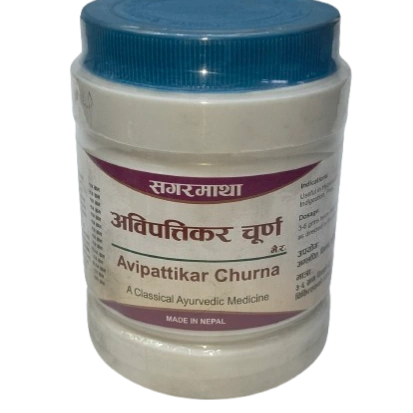

Sagarmatha Avipattikar Churna -200gm
0
Shipping is calculated at checkout
Description
Avipattikar churna is an Ayurvedic formulation comprised of powdered herbs. Like many Ayurvedic polyherbal formulations, Avipattikar churna is typically prescribed for gastrointestinal problems.2
In particular, Avipattikar churna is believed to be tailored for the treatment of amlapitta, an Ayurvedic term that refers to excessive acidity in the stomach. Amlapitta may present as several conditions, including gastritis, heartburn, gastric ulcer, and upset stomach.2
Avipattikar churna contains 14 different Ayurvedic herbs:2
Shunthi (Zingiber officinale)
Maricha (Piper nigrum)
Pippali (Piper longum)
Haritaki (Terminalia chebula)
Vibhitaka (Terminalia bellerica)
Amalaki (Emblica officinalis)
Musta (Cyperus rotundus)
Salt (Vida Lavana)
Vidanga (Embelia ribes)
Ela (Amomum subulatum)
Patra (Cinnamomum tamala)
Lavanga (Syzygium aromaticum)
Trivrit (Operculina turpethum)
Khanda sharkara (sugar candy)
Avipattikar churna can be found in supplement form. You can also make Avipattikar churna if you have access to all of its ingredients and the ability to grind them into a powdered form.
Almost 50% of Avipattikar churna is comprised of khanda sharkara, a traditional form of raw sugar widely used in Ayurvedic medicine. The second major ingredient is trivrit, at 33.33% of the formulation. Lavanga is the third largest component, at 8.33%. The remaining 11 ingredients are minimal in quantity, each representing 1/11th of the Avipattikar churna formulation.2
Benefits of Avipattikar Churna
According to the principles of Ayurveda, health problems often result from imbalances in the three doshas: Vata, Pitta, and Kapha. Avipattikar churna is often used to treat imbalances in Pitta, the dosha most associated with digestion.3
Although practitioners of Ayurvedic medicine have long used Avipattikar churna to enhance digestive health and treat conditions affecting the digestive system, very few scientific studies have tested the formula's effects. Keep in mind that no supplement is intended to treat, cure, or prevent disease.
Peptic Ulcers
In an animal study from 2013, Avipattikar showed promise in the treatment of peptic ulcers, a condition marked by sores in the lining of the stomach, esophagus, or small intestine.4
In the study performed on rats, researchers determined that at a dose of 500 milligrams per kilogram (mg/kg), Avipattikar churna helped discourage the development of peptic ulcers by reducing the secretion of stomach acid.4
It should be noted that these results have not been repeated in humans, a necessary step before Avipattikar churna is determined to be a safe and effective treatment option for peptic ulcers.
Colicky Pain
Colic refers to severe, often fluctuating spasmodic abdominal pain that occurs in waves. Although it is most commonly associated with infants, adults can experience colic, too.
The herbs Ela, Lavanga, and Tamala Patra have been studied for their antispasmodic (anti-muscle spasm) and carminitive (anti-flatulence) effects.5 Each of these herbs contain essential oils that evidence suggests could reduce colicky pain, although more research in humans is needed.
Other Uses
Aside from peptic ulcers, Avipattikar churna is often used in Ayurvedic medicine to treat common digestive issues like:
Constipation
GERD (gastroesophageal reflux disease; acid reflux)
Unfortunately, human studies on Avipattikar churna are lacking. Despite its traditional use in ancient Indian medicine, Avipattikar churna's use for these and other conditions is not currently supported by scientific evidence. Consult a healthcare provider if you are experiencing any digestive-related problems.
0
